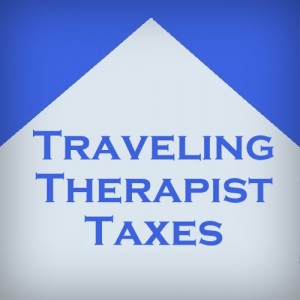This recent post on the discussion board from a new traveler had so many good questions in one place that I thought I would take the time to answer a little more in depth and share the dialogue more broadly. I hope this helps other therapists who are new to traveling!
I’m a Respiratory Therapist with 5 years of experience and am considering doing Travel Therapy for a few years. The thought of traveling to new states and having increased income is very attractive. However, I do have a few concerns that I was hoping someone with experience could assist me with.
Housing/Insurance
On paper, it appears traveling is a tremendous increase in pay versus permanent jobs and with allotments boost the net even further. My question is if I elect to have housing provided to me and to have health insurance coverage, does that negate the increase in pay? To those who have traveled before: where else could you live short-term (3-6 months) and come out ahead instead of electing to have housing provided?
Yes, taking health insurance through your employer and allowing them to place you in housing will cut into your hourly pay. Insurance will only minimally cut into your pay. For most of my time traveling, I carried my own insurance and was only able to get $1 extra per hour worked into my contract. So, figure $1/hr out of your contract for insurance,
There are a lot of different options for housing, and in my opinion, taking the housing assigned by the agency is the worst option. If you do take housing through the agency, as I did on my first travel assignment, you will find it very convenient. The agency will arrange a nice apartment for you with furniture, ready to move in, but it will cost you considerably. It will take a little more footwork to find a furnished space on craigslist or by looking up local classified ads in the community you are headed to, but you will be able to choose a living space in a neighborhood of your choosing, and you will likely be able to beat what the agency will charge you for housing.

The camper I lived in on Martha’s Vineyard. We had considered a houseboat initially…. maybe next time.
The final, more eccentric option, is living in a camper. A lot of people who plan to travel for a a while in temperate places take their whole life on the road with them. This can also be a more convenient option for travelers with pets. If this appeals to you, the facebook group Highway Hypodermics can be a great resource.
Taxes/Reimbursement
If I work in multiple states as a traveler, are there any tax exemptions? I don’t want to owe a great deal at the end of the year. Will I be reimbursed for travel, new licenses, uniforms?
One of the main benefits as a traveler is the tax free monies you can receive. First is your housing stipend. If you don’t take the agency’s housing, they provide you a tax free stipend – hopefully you find housing for less than the stipend so you can pocket the rest of the money. The second main source of tax free money is your per diem. The IRS regulates both the housing stipend and per diem – a cap is set on each by cost of living in the area code you are working in. If the per diem or housing stipend is low compared to your hourly pay, there may be an opportunity for you to negotiate some taxed hourly wage into a tax free category. It’s one way to maximize your take home without too big of a hit to the agency. However, too low hourly pay compared to your tax free monies can be a red flag for an IRS audit of your employer, so many agencies will have a limit to how far they will push that barrier. With all of this said, income tax laws vary wildly by state and you may find you owe states a certain percentage of your earnings at the end of the year – but this only applies to your taxed hourly wages, not your tax free money.
It’s good to ask for any potential reimbursements prior to signing your contract. Licensure fees are typically reimbursed. You will usually get a set amount for relocation – anywhere from $500 to $2000 at most (another good area to target for negotiations to squeak in a little more money. I’ve never had uniforms reimbursed, but it sounds like a very reasonable item to ask your recruiter for reimbursement on.
I’m an adult RT therapist with experience in acute and an LTACH, are the opportunities less if my Peds experience is limited?
As long as you are open to new experiences and settings, I think you will find your options wide-open. Traveling has been a wonderful way for me to gain experience in settings I otherwise never would have worked in. After a couple of assignments, my breadth of experiences had expanded greatly and even more opportunities were available to me. After those initial experiences, I could confidently step into almost any setting.
Cancelled Contract
Has there ever been a time when a contract is rescinded prior to start? In that case what does the company do?
I have never had a contract cancelled in 10 years of traveling – except for one time when I broke my arm and couldn’t work. However, it does happen. That is the main risk in traveling and you just have to be willing to roll with the punches and be flexible to adapt. Typically, there is a clause in your contract that allows you to leave a contract with 30 days notice, but you do not necessarily receive the same protection from an employer cancelling the contract (ask your recruiter about the policy for your company). Typically, a facilities staffing needs are well thought out. They don’t hire a traveler unless they need one. If you are a good employee and good fit for the facility, you shouldn’t have to worry about your contract being cancelled.
Recruiters
Since I have a lack of experience in traveling, I also don’t know which companies are the favorable ones. Any suggestions?
I’m going to refer you to this blog post on your first travel job for a couple tips on selecting a recruiter. Basically, if you don’t feel well taken of, move on to another company. There are many, many agencies and a lot of them recognize that the clinician is the commodity. Without us working, willing to take travel jobs, there would be no travel industry and there would be no recruiters – find one that’s willing to make you feel needed.

Surfing Waikiki after work one day. Traveling therapy is the best thing ever.
Overtime
Can you sign up for overtime?
If you are considering overtime, take that into consideration when arranging your contract. Typically, overtime is paid at 1.5 times your regular hourly rate. However, your hourly is going to be pretty low because of all the tax free money you will also be receiving. On one job, I knew I would be working some overtime, so I was able to negotiate a flat rate for any overtime hours to make sure I was making reasonable overtime pay for overtime hours.
It is really going to depend job-to-job on whether overtime is available – make sure to ask during any interviews you have.
Overall, I’d like a good experience and to be able to earn enough to pursue my dream location. I just want to know it’s worth it.
Traveling therapy is awesome. Pay can vary greatly place-to-place. Just weigh your priorities and if getting out and seeing new states and facilities is one of your priorities, then travel is definitely for you!
For other therapists trying to figure out where to start, this link is a great place to get started with travel therapy. Also, don’t forget to follow HoboHealth on Facebook and on Twitter @HoboHealth.




 $10,350 less for our estimated traveling costs brings us down to $68,850 after taxes, or the equivalent of a $95,625 taxed salary.
$10,350 less for our estimated traveling costs brings us down to $68,850 after taxes, or the equivalent of a $95,625 taxed salary.

 Introduction
Introduction Traveling Therapist: My wife and I traveled for a while but then had accepted permanent jobs, we are considering the traveling therapist life again and this brought up some questions in our minds. We are currently renting in Kansas, but when we go to travel again, we are trying to figure out what we need to do as far as claiming a tax home. I was originally living in my parents’ retirement house in Florida and was paying rent to them. My concern is that I might not have a place to claim as my tax home when we go back to traveling. Have you bought a house? What is the best way for us to claim a tax home?
Traveling Therapist: My wife and I traveled for a while but then had accepted permanent jobs, we are considering the traveling therapist life again and this brought up some questions in our minds. We are currently renting in Kansas, but when we go to travel again, we are trying to figure out what we need to do as far as claiming a tax home. I was originally living in my parents’ retirement house in Florida and was paying rent to them. My concern is that I might not have a place to claim as my tax home when we go back to traveling. Have you bought a house? What is the best way for us to claim a tax home? Note: I have included a lot of links in this piece and there is a ton of information beyond this article through those links. If you are a new grad therapist looking into travel, take the time to explore these links. Some are other pieces about new grads traveling, some are about professional development, and some are conversations on the discussion board that are pertinent. Note 2: I’m going to write this post using “Physical Therapist” language, but I believe this topic applies to speech and occupational therapists as well. I feel passionately about this particular post and found myself getting bogged down in language trying to be more inclusive of all therapists – so, forgive me, I really mean all therapists, but as a PT, I just write more gooder when I can write in the terms most familiar to me.
Note: I have included a lot of links in this piece and there is a ton of information beyond this article through those links. If you are a new grad therapist looking into travel, take the time to explore these links. Some are other pieces about new grads traveling, some are about professional development, and some are conversations on the discussion board that are pertinent. Note 2: I’m going to write this post using “Physical Therapist” language, but I believe this topic applies to speech and occupational therapists as well. I feel passionately about this particular post and found myself getting bogged down in language trying to be more inclusive of all therapists – so, forgive me, I really mean all therapists, but as a PT, I just write more gooder when I can write in the terms most familiar to me.
 After being a traveling PT for 8 years, I sometimes forget that what now seems like a pretty routine process was very intimidating and complicated at first. This post describes what you can expect in the process of getting your first traveling therapy job. I have another page that you can link to under the “
After being a traveling PT for 8 years, I sometimes forget that what now seems like a pretty routine process was very intimidating and complicated at first. This post describes what you can expect in the process of getting your first traveling therapy job. I have another page that you can link to under the “

